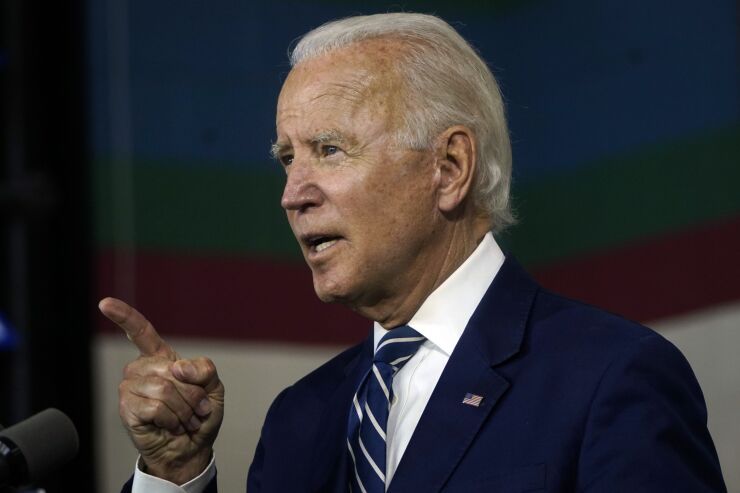Joe Biden is threatening to eliminate a tax benefit worth billions of dollars to the real estate industry in an attack on President Donald Trump, a property developer who has boasted about using the tax code to his advantage.
The plan would target a provision for avoiding capital gains taxes on property sales to raise cash for childcare and elderly services. Known as the like-kind exchange, the tactic allows investors to roll the proceeds of real estate sales into future purchases, shielding investors from taxes on their profits.
The strategy is projected to save investors $51 billion between 2019 and 2023, according to Congress’s Joint Committee on Taxation. Whether or not it is repealed, the proposal lets Biden contrast his bid to help single parents and aging Americans with Trump’s career in real estate.

“Part of this is political, in the sense that people are looking specifically at real estate, because of the president’s ownership of the asset and also because of the sense that real estate owners have been particular winners during this administration,” said Chris Mayer, co-director of the Paul Milstein Center for Real Estate at Columbia Business School.
The bid to end the real estate tax benefit emerged, with very few details, as part of Joe Biden’s economic plan. The next administration will be looking for ways to raise revenue to fill holes in the budget from the COVID-19 shutdown.
The like-kind exchange rule has existed in the tax code for many decades, and until recently applied to things like industrial equipment and rental cars. Congress closed the loophole for most industries in the Tax Cuts and Jobs Act of 2017, the Trump administration’s signature legislation, but left it open for real estate.
Kushner Cos., the real estate firm once run by Trump’s son-in-law and adviser Jared Kushner, has been a beneficiary of the strategy. In 2017, the company
It’s not the only benefit in the tax code that primarily benefits property investors. Real estate developers can claim write-offs for losses on borrowed money. They also get to claim depreciation on buildings, which, unlike farm equipment or factory machinery, generally increase in value. During a televised presidential debate in 2016 with Hillary Clinton, Trump said he used depreciation to reduce taxes. “I love depreciation,” he said.
For their part, real estate investors say that like-kind exchanges improve liquidity in the market, and eliminating the benefit would reduce the number of transactions that could generate tax revenue. They also point out that the industry is already reeling from the fallout of the COVID-19 pandemic, which has shuttered hotels and shopping malls and led property owners to skip payments on billions of dollars of debt.
“I am not sure kicking our critical industry when it is already down in the dumps makes a lot of sense,” said Bruce Stachenfeld, the chairman of Duval & Stachenfeld LLP, a real estate-focused law firm in New York. “I wonder if it might make more sense to pick an industry that is doing really well right now to pay for these programs.”
On Monday, Biden teased his “caring economy” plan at a fundraiser hosted by Blackstone Group Inc. President Jonathan Gray, telling donors he wanted to make it easier for elderly Medicaid recipients to receive care at home.
On its merits, the like-kind exchange — sometimes referred to as a “1031” exchange for its tax code designation — is difficult to defend, according to some tax experts.
“There are big real estate investors who are very comfortable with the idea that they don’t pay taxes,” said Steve Wamhoff, director of federal tax policy at the left-leaning Institute on Taxation and Economic Policy. “They think it’s shocking to think their industry would have to operate without subsidy from the IRS.”
— With assistance from Tyler Pager





